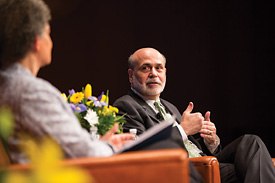Federal Reserve Chairman Ben Bernanke said last week that the Fed has been doing its part to move the slow economy forward, and that Congress must do the same to keep the recovery on track.
Specifically, he said Congress must raise the debt ceiling to head off a risky lowering of the United States’ credit rating, a likely outcome of congressional inaction.

Fed Chairman Ben Bernanke touched on a variety of topics during his conversation with Ford School Dean Susan Collins and in answering audience questions. Photo by Austin Thomason, Michigan Photography.
“Not raising the debt is like a family saying, ‘I know how to save money — we won’t pay our credit card bills.’ It’s very important that Congress take action to raise the debt ceiling,” he told the audience that filled Rackham Auditorium.
Bernanke, Fed chairman since 2006, shared the stage with Susan Collins, dean of the Gerald R. Ford School of Public Policy. His comments and evaluation of the current state of the U.S. economy were sparked by questions from Collins to open the program. He later took questions from students and via Twitter.
“I want to see our economy recover. I want to see a stronger labor market, and see fiscal issues addressed. Things are not moving as fast as we’d like,” he said, adding, “I am cautiously optimistic about the next few years.”
In opening remarks, Collins said the Fed’s charge is to promote a healthy economy and a stable financial system. She said Bernanke is uniquely qualified to serve as Fed chair, as a respected economist who taught at Harvard, MIT and Stanford before joining Princeton’s faculty.
Collins asked Bernanke what he thought of the deal to avoid the fiscal cliff. He said the deal importantly sustained the recovery without pushing the economy back into recession, and that there is much more work to do to fix the economy. “It’s very important to bring the federal budget under control in the next two decades,” Bernanke said.
The Fed chairman said the nation’s central bank has been successful in bringing short-term interest rates down close to zero, and that it hopes longer-term interest rates will move in sympathy. Bernanke said 3.4 percent home mortgage rates are helping the housing sector recover, by sparking construction and related activity.
“We would like to see a stronger labor market. Nearly 8 percent unemployment is not an acceptable situation. Skills and talent are wasted,” he said. Bernanke added the Fed would continue to evaluate policies to measure their impact. They include an aggressive monetary policy, which is keeping inflation at less than 2 percent.
Bernanke, a Great Depression scholar, said history “helps you see what your predecessors did wrong and what they did right.”
He said that a lesson the Depression teaches was that federal officials overseeing that recovery did little to stabilize the banking system. He said that in 2007-08, to deal with the recession, “We did help to stabilize the global financial situation and began a process to bring back the economy.”
Bernanke said that while much of Europe has been in recession, and some emerging market economies such as China and India have slowed, there has been progress in Europe to stabilize the financial markets.
Asked by a student if the debt ceiling has a practical purpose, Bernanke responded that other countries don’t have such a mechanism. “It would be a good thing if we didn’t have it. The possibility of default would be very costly,” he said.
Bernanke said he rejects efforts discussed in Congress to further audit the Federal Reserve beyond the current level of review. “If you want a healthy economy you want a strong independent federal bank,” he said.
He opened the program saying he wanted to take a minute to remember Edward “Ned” Gramlich, a former member of the board of governors of the Federal Reserve who died in 2007. Gramlich was a longtime Ford School faculty member and director of the school’s predecessor, the Institute of Public Policy Studies.
“He was a terrific colleague,” Bernanke said.

